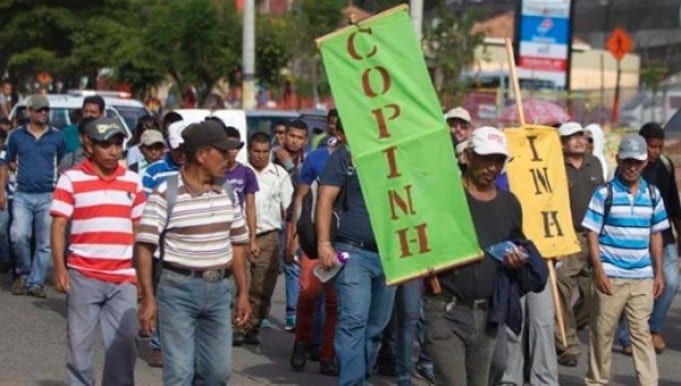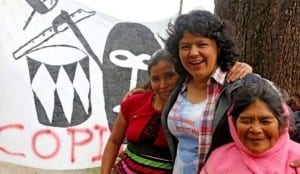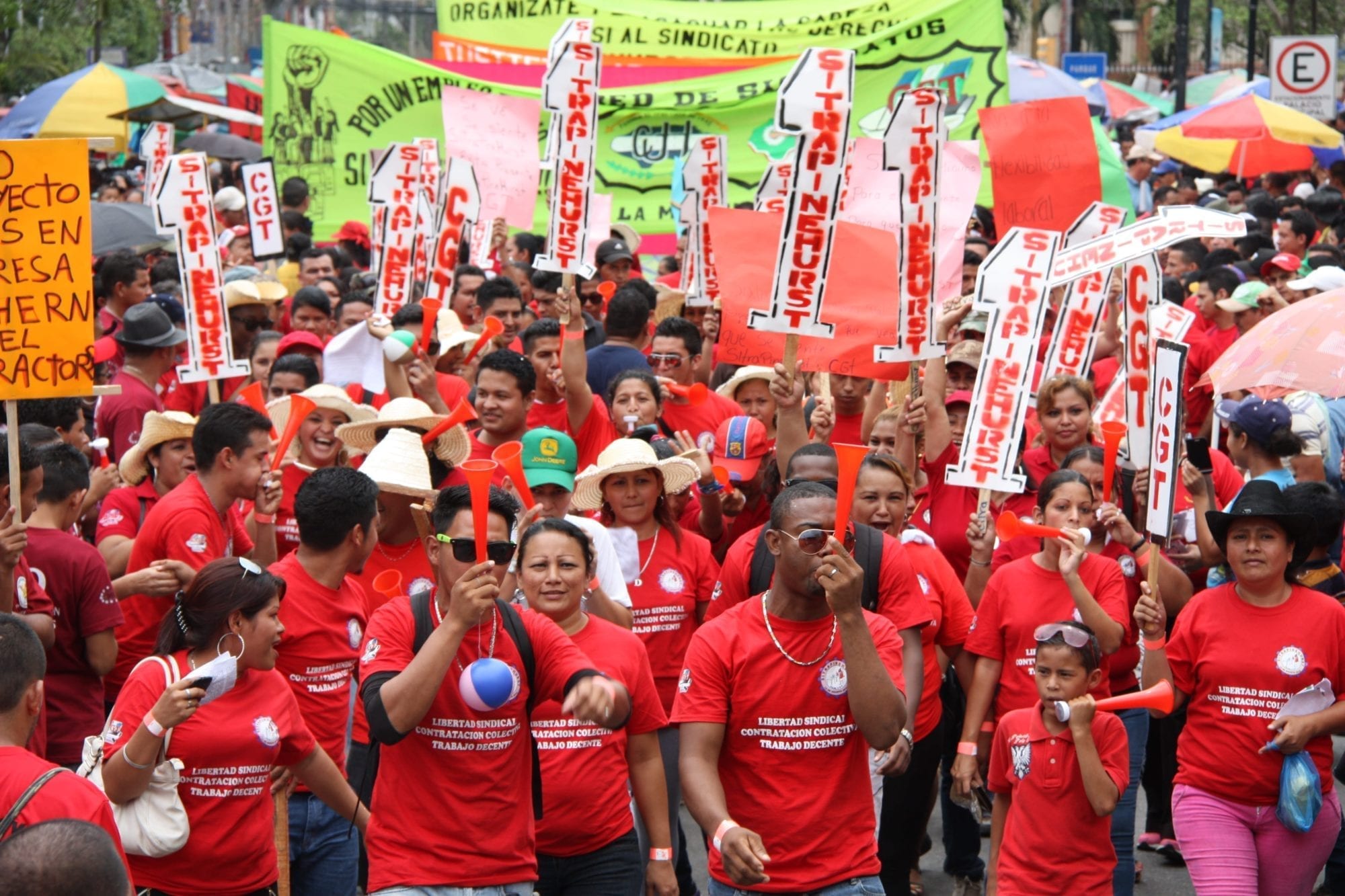
Mar 18, 2016
The murder of a second Honduran rights activist, Nelson Noé García this week, days after the assassination of Berta Cáceres, a globally recognized leader for indigenous rights and environmental justice, has widened international outrage and amplified demands for justice, security, respect for basic rights and an end to impunity for perpetrators.
The Center for International Justice and Rights strongly condemned Nelson’s murder. Marcia Aguiluz, CIJR director for Central America and Mexico, said it “proves that the spiral of violence against indigenous peoples fighting for their territories in Honduras remains with impunity.”
García, 38, a father of five, was a member of the Council of Indigenous and Popular Organizations of Honduras (COPINH), co-founded by Cáceres. Local media report that García received four gun shots to the face and suggest the attack followed the forceful eviction of at least 150 families in the village of Tilapia by military police.

Berta Cáceres (center), murdered March 3, won the prestigious Goldman Environmental Prize for her opposition to one of the region’s biggest hydroelectric projects. Credit: Democracy Now!
The same day as García’s murder, the president of Unified Campesino Movement of the Aguán, another indigenous group, was briefly arrested on questionable charges; Cristián Alegría, a campesino activist, was shot at; and David Romero, a journalist critical of the government, was sentenced to 10 years in prison. In addition, Gustavo Castro, a Mexican activist who witnessed Cáceres’s murder, has been prevented from leaving the country.
Targeted murders of human rights activists and union members have helped make Honduras one of the most dangerous countries in the world for human rights defenders.
Union activists are targeted to silence demands for economic justice, freedom of association and other basic rights. Over the past 12 months, the Solidarity Center has documented 13 cases of threats or violence against union activists, including the disappearance of Donatilo Jiménez in April 2015, the murder of Héctor Martínez Motiño in June, and repeated death threats against longtime Solidarity Center allies Tomas Membreno and Nelson Geovanni Nuñez Chávez, both of the Sindicato de Trabajadores de la Agroindustria y Similares (STAS) industrial agricultural workers’ union.
In the United States, more than 60 Congress members yesterday asked Secretary of State John Kerry and Treasury Secretary Jacob Lew to suspend aid to Honduras security until an international investigation into the murder of Cáceres.
The Inter-American Commission on Human Rights had mandated “precautionary measures” to protect Cáceres, Motiño and Jiménez—which were not borne out in practice. This week, 23 U.S. Congress members sent a letter to U.S. Secretary of State John Kerry urging the State Department to take concrete action to address the situation of activists in Honduras.
The AFL-CIO has expressed deep concern with human rights and sustainable development in Honduras based on the findings of an October 2014 labor delegation that met with labor and community organizations, the Honduran government and the U.S. embassy.

Nov 17, 2015
Honduran union leader Nelson Geovanni Nuñez Chavez was forced to leave his home with his family last week after repeatedly being followed and harassed, according to the Honduras-based nonprofit ACI-Participa. Nuñez Chavez is technical adviser to the Honduran agricultural workers’ union, Sindicato de Trabajadores de la Agroindustria y Similares (STAS), and host of the radio program, “The Unionist, Live.”
In late October and early November, strangers in a black pickup truck with tinted windows repeatedly parked outside Nuñez Chavez’s home in El Progreso and took photos of the house from different angles, according to ACI-Participa. Nuñez Chavez says he when he attempted to file a report with the police officials, they would not accept it because they said no harm had occurred.
Nuñez Chavez’s radio host predecessor, José María Martínez, a STAS ally, was forced to leave the country in July 2014 following repeated death threats against him and his family. At least nine union leaders have been attacked or killed in Honduras this year, and others have been threatened with violence. (ACI-Participa recently released a report, in Spanish, documenting violence against union leaders.)
El Progreso, in northern Honduras, is surrounded by plantations producing palm oil, bananas and vegetables. Nelson Nuñez is among union leaders helping agricultural workers who are contracted or employed in the sector to form a union.
In September, STAS President Tomás Membreño Pérez received death threats by phone and on Facebook and was followed as he traveled to the Santa Rita banana plantation where he was helping workers get a voice on the job. Like several union leaders threatened, attacked or murdered, Pérez is a member of the Network of Unionists against Antiunion Violence. The network, which includes ACI-Participa and the Solidarity Center, was launched late last year to combat government corruption and stand up to increasing violence and threats against worker rights activists.
Violence against union leaders in Honduras nearly always goes unpunished, even though Honduras is under scrutiny for failure to enforce its labor laws. The United States is waiting for the Honduran government to present a corrective plan of action to address labor rights violations, a move required after the U.S. Department of Labor’s Office of Trade and Labor Affairs last year accepted a complaint under the labor chapter of the Central American Free Trade Agreement (CAFTA).
The AFL-CIO and 26 Honduran unions and civil society organizations filed the complaint in March 2012. In a February 2015 report, the U.S. Trade and Labor Affairs office said Honduras has made virtually no progress since then.
The network issued a public appeal to the national police, national commissioner for Human Rights, the Human Rights Department and other state institutions “to take the necessary measures to safeguard” Nelson Nuñez’s life.

Sep 28, 2015
Another union leader in Honduras has received death threats and a second union leader was arrested in the department of Colon during a peaceful rally protesting government corruption, according to the Honduras-based nonprofit ACI-Participa. Earlier this year, one Honduran union leader was murdered and another disappeared and is presumed dead. The latest incidents bring to nine the number of attacks on union leaders in 2015.
Isela Juarez Jimenez, president of the public employees union SITRASEMCA, began receiving death threats earlier this month and last week, her motorbike was rammed by a white Toyota, which had been following her for days. Jimenez was not injured.
SITRASEMCA has been in the forefront of opposition to government corruption and a water privatization scheme. More than half of all households in Tegucigalpa, the capital, do not have access to potable water and a plan supported by a government commission to privatize the water supply likely would make access to clean water prohibitively expensive for many residents.
Meanwhile, Heber Rolando Flores, a leader in the union representing workers of the National Agrarian Institute, was arrested and charged with sedition for taking part earlier this month in a peaceful rally in which students, workers and the public were protesting government corruption. Flores must report weekly to the Public Ministry until his court hearing.
Both Juarez Jimenez and Rolando Flores suffered physical attacks at the hands of security forces (including the National Police and the Army) as the September 1 anti-corruption rally was violently repressed by the state.
Violence against union leaders in Honduras nearly always goes unpunished, even though Honduras is under scrutiny for failure to enforce worker rights under its labor laws. The United States is waiting for the Honduran government to present a corrective plan of action to address labor rights violations, a move required after the U.S. Department of Labor’s Office of Trade and Labor Affairs last year accepted a complaint under the labor chapter of the Central American Free Trade Agreement (CAFTA).
The AFL-CIO and 26 Honduran unions and civil society organizations filed the complaint in March 2012. In a February 2015 report, the U.S. Trade and Labor Affairs office said Honduras has made virtually no progress since then.
A delegation of U.S. union leaders traveled on a fact-finding trip to Honduras late last year, where they described the widespread noncompliance with laws, including attacks against labor leaders, a lack of compliance with minimum wage laws and an unresponsive government. Based on the delegations’ findings, the AFL-CIO issued a report describing the exploitative conditions workers experienced in factories and in their communities. According to the report:
“Throughout the delegation visit, workers and community leaders spoke not only about the extreme levels of corruption, but also the increased militarization of the country, and widespread corruption among security forces and the impact it had on their daily lives.”
Many union leaders reporting threats and harassment are members of the Network Against Anti-Union Violence in Honduras, coordinated by leadership of the national labor confederations and the human rights NGO ACI-Participa, which seeks to promote respect for human rights in Honduras, encourage people to exercise their right to participate in decision-making processes and push for transparency in government and private-sector institutions charged with providing public services.

Sep 11, 2015
A second Honduran union leader and participant in the Network Against Anti-Union Violence in Honduras has been threatened with death if he does not stop his union-related work, according to the human rights group Aci Participa.
Tomás Membreño Pérez, president of the agricultural workers union, Sindicato de Trabajadores de la Agroindustria (STAS), received death threats by phone and on Facebook in recent days and was followed as he traveled to the Santa Rita banana plantation where he is helping workers get a voice on the job.
One Honduran union leader has been murdered this year who also was a member of the anti-violence network and another union leader disappeared and is presumed dead. In July, the president of the health care union reported receiving death threats. (ACI Participa has documented more such cases.)
The network, comprised of union activists and ACI-Participa, was launched late last year to combat government corruption and stand up to increasing violence and threats against union activists. Among them, José Maria Martinez, an active union member who hosted a popular pro-worker radio show, was forced to flee Honduras twice because of death threats in 2013 and 2014.
Honduras: No Progress in Addressing Worker Rights
Pérez also is active on the Honduran labor movement’s Central American Free Trade Agreement (CAFTA) Complaint Commission, which has received numerous documented cases of worker rights abuse in the banana and agricultural sectors in Honduras.
The United States passed the CAFTA agreement in 2005. In 2012, the AFL-CIO and 26 Honduran unions and civil society organizations filed a complaint under CAFTA’s labor chapter with the U.S. Department of Labor’s Office of Trade and Labor Affairs alleging the Honduran government failed to enforce labor rights under its labor laws. The trade and labor affairs office accepted the complaint in 2014, and the United States is waiting for the Honduran government to present its corrective plan of action. In a February 2015 report, the U.S. Trade and Labor Affairs office says Honduras has made virtually no progress since 2012.
‘Overwhelmed’ by Violence, Attacks on Worker Rights
The Santa Rita banana plantation is included in the 2012 complaint under its previous name, Tres Hermanas. As the AFL-CIO points out, Santa Rita, now a subsidiary of Chiquita, owes full-time and temporary workers nearly $50,000 for unpaid overtime and other wages.
In addition, Honduran unions reported that the Labor Ministry selected an employer-controlled union to represent workers at the plantation, even though it is documented that STAS is supported by 136 workers out of 145. In a July 2015 letter, the AFL-CIO asked the Honduran secretary of Labor and Social Security to address the issue.
Last October, a delegation of U.S. union leaders to Honduras reported that they were “overwhelmed” with the information they received from union activists about widespread noncompliance with laws, including attacks against labor leaders, a lack of compliance with minimum wage laws and an unresponsive government. The delegation issued a scathing report on the conditions.
Aug 10, 2015
Another union leader in Honduras, where violence is commonplace, has received a death threat. José Armando Flores Jimenez, president of the Union of Health Workers in eastern Honduras-SITRASAOH, was threatened for allegedly making public the discovery of medications buried on the grounds of Health Region Number Seven buildings in El Paraiso, possibly to divert them from public use.
Flores, a member of the Network Against Anti-Union Violence in Honduras, is the second member of that network to be targeted for violence.
The first, Héctor Martínez Motiño of the university workers’ union SITRAUNAH, was shot and killed by gunmen in June as he drove home from work after three other attempts on his life and numerous anonymous threats, linked to his reporting of violations of human and worker rights within the university.
The Network Against Anti-Union Violence in Honduras is comprised of labor union activists and the human rights non-governmental organization ACI-Participa, and is supported by the Solidarity Center.
Honduran trade unionists are routinely threatened, intimidated, harassed and even murdered, and criminals are rarely brought to justice. A damning report documenting widespread and serious violations of labor rights in Honduras was issued by the U.S. Department of Labor in March this year and was prompted by a complaint filed in 2012 by the AFL-CIO and 26 Honduran unions and NGOs under the Labor Chapter of the Central America Free Trade Agreement (CAFTA).
Learn more here.





